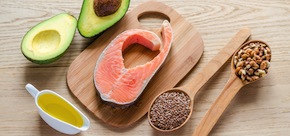Fat. We’re told to be fearful it. If there’s fat in our food it’s going make us fat. But just how wicked is fat?
The first thing to realise is that there are good fats and bad fats. Bad fats increase cholesterol and your risk of other diseases, while good fats support your general health and are essential for maintaining physical and brain health.
If eaten in large amounts, all fats can contribute to weight gain. To get a comprehensive understanding of which fats are good and which you should avoid, you need to know the difference.
Good fats: monounsaturated fats and polyunsaturated fats. These play a part in weight loss and management, mental health, and overall body health.
Bad fats: trans fats and saturated fats. There are responsible for weight gain, clogged arteries, heart conditions and diabetes. Foods containing bad fats should be limited in or omitted from the diet. However, cheese, full cream milk and non-lean meats may be eaten in small amounts.
So which foods contain good fats?
Monounsaturated fats:
- monounsaturated oils – e.g. coldpressed olive, peanut, canola, sesame, sunflower oil
- avocados
- olives
- nuts (almonds, macadamia nuts, hazelnuts, pecans, cashews, peanuts, peanut butter).
Polyunsaturated fats:
- omega-3 rich fish – e.g. salmon, tuna, mackerel, herring, trout, sardines\
- tofu
- soy milk
- sunflower, sesame, flax, and linseeds
- soybean, corn, safflower oil
- omega-6 rich nut – e.g. walnuts, pine nuts, Brazil nuts.
The Heart Foundation recommends Australians eat two or three serves (150 grams per serve) of oily fish every week. Ground seeds and nuts can be sprinkled on breakfast cereals and salads, or eaten whole and unsalted as a snack.
How much fat you should eat per day depends on how many calories your body requires to function daily. One simple, sensible guide often suggested is a diet made up of 40 per cent carbohydrates, 30 per cent protein and 30 per cent fat.
Which foods should you limit?
Saturated fats:
- fatty and processed meats
- chicken skin
- butter
- cheese
- ice cream
- palm and coconut oil
- full-fat milk and cream
Trans fats:
- packaged and commercially baked foods – e.g. pastries, pies, chips, crackers, pastries, cookies, doughnuts, muffins, cakes
- Fried and takeaway foods – e.g. hot chips, fried chicken, chicken nuggets, crumbed fish
- chocolate and lollies
- hydrogenated fats.
Read more at Eatforhealth.gov.au.

